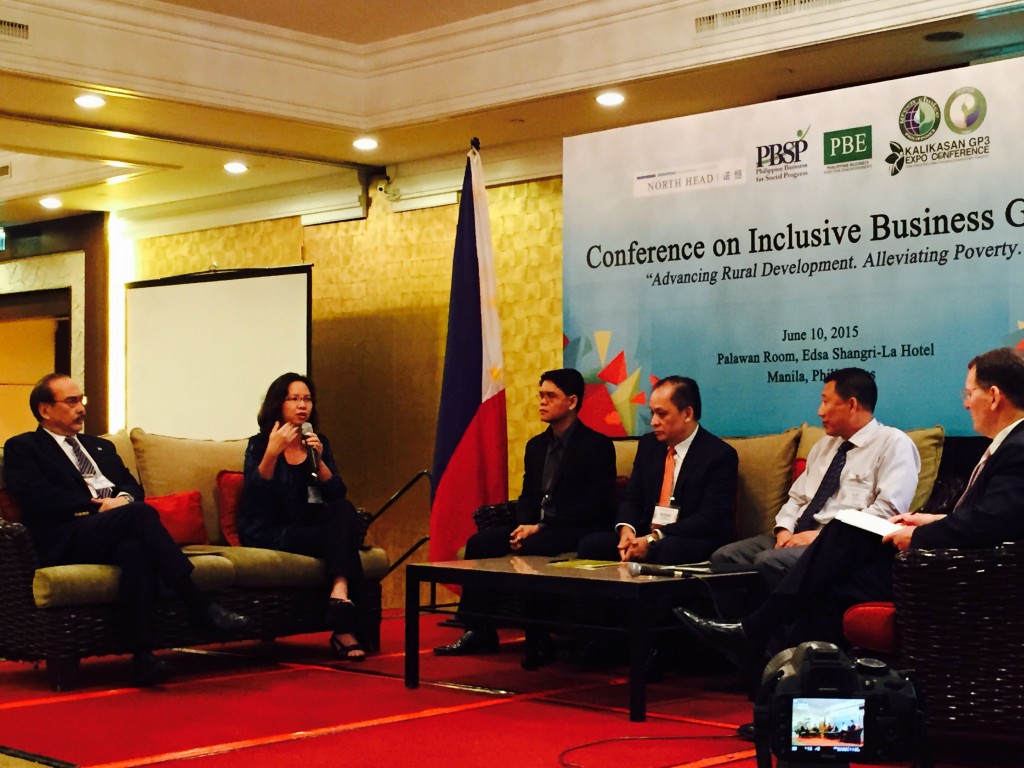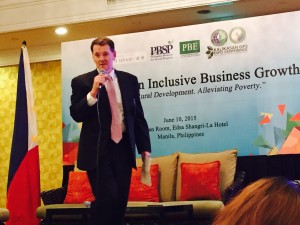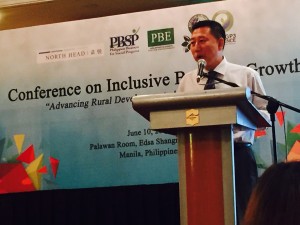Agriculture key to PH rural dev’t, poverty alleviation

Panelists discuss policies on rural development and poverty alleviation in the Philippines and in Asia during a conference on inclusive growth in Mandaluyong City on Wednesday. PHOTOS BY YUJI GONZALES
Uplifting the country’s agricultural sector through industrialization and proper investments will yield significant results in rural development and poverty alleviation efforts.
This is what business associations agreed upon during a conference on inclusive growth held at Edsa Shangri-La Hotel in Mandaluyong City on Wednesday.
The conference, which was aimed at discussing how economic integration would help rural poor communities improve their quality of living, underscored the role of an efficient agricultural sector in reducing poverty incidence.
In his keynote speech, Rolando Dy, executive director of University of Asia and the Pacific’s Center for Food and Agribusiness, cited low farm productivity as a major factor why majority of residents in rural areas were living below the poverty line.
“Improving farm productivity will uplift the agricultural value from farm to plate,” Dy said, noting income security preceded food security.
Citing data from World Bank, Dy said 47 percent of the world’s total population resided in rural areas, with the Philippines lagging behind in poverty reduction.
To end the “vicious cycle of poverty,” Dy said the Philippines should draw inspiration from agribusiness models of its neighboring countries, which had been focused on rural job creation.
“Inclusive growth is a paramount societal concern and it is important that businesses help the rural poor by improving productivity and assisting in creating their incomes,” he added.
Echoing Dy’s sentiments, John Russell, managing director of public affairs consultancy North Head, said inclusive growth is an “important objective” that needed to be addressed by the Asia Pacific Economic Cooperation (Apec).
“Rural development will unleash higher growth rates across the Apec while promoting true inclusiveness,” he said, noting that 80 to 90 percent of Apec’s developing population lived in rural areas.
Russell lauds the Apec conference, which is being hosted by the Philippines this year with the theme “Building Inclusive Economies, Building a Better World,” for its “growing enthusiasm” to deal with the issue of inclusive growth.
Rural enterprise, urbanization
Meanwhile, Prof. Liu Yonggong of China Agricultural University’s Center for Integrated Agricultural Development shared China’s approach and strategies in rural development and poverty alleviation.
Yonggong said rural enterprise and agro-industrialization in his country provided more employment opportunities for Chinese farmers.
Boasting of a reduced poverty incidence and an increased per capita income in China, the professor also emphasized the importance of crafting a national poverty alleviation program.
“Poverty incidence in China was reduced from 30 percent in 1978 to five percent in 2014,” he said.
Representatives from the private sector supported Yonggong’s statement, saying rural people needed a more diversified source of income without actually deviating from what they do best.
While acknowledging that rural spaces needed urban attention, Ayala Land Inc. planning manager Anna Gonzales said the construction of farm-to-market roads was not the only way to industrialize rural areas.
“It takes people out of where they should be productive,” she said. “[Construction of farm-to-market roads] is not a very efficient way of using lands as all the development occur on the side of the roads.”
“We have to develop [rural] spaces in such a way that won’t create walls. Rural people need urban services, and urban people need rural services,” Gonzales said, calling the division between rural and urban “artificial.”
Nestle Philippines business transition head Ernie Mascenon said industries should make business models that would enhance not only a company’s competitiveness but also the communities that they served.
“Stakeholder investment is very, very critical,” he said, adding the initiatives of the government and nongovernment organizations also mattered.
Mascenon also highlighted the importance of promoting disaster preparedness in rural areas, as annual natural calamities heavily damage agricultural lands.
Noting that agricultural development in the Philippines was mainly resource-based, Philippine Center for Environmental Protection and Sustainable Development Inc. (PCEPSDI) executive director Jun Alvarez backed Mascenon: “We must come up with climate change proofing mechanism in sustaining rural development.”
Proposing institutional changes in politics, Dy wrapped up the conference by encouraging businesses to expand, saying there was more “continuity and management practice” in the private sector than in the government when it came to addressing rural poverty.
The North Head-initiated conference was co-organized by Philippine Business for Social Progress, Philippine Business for the Environment and PCEPSDI. RC

